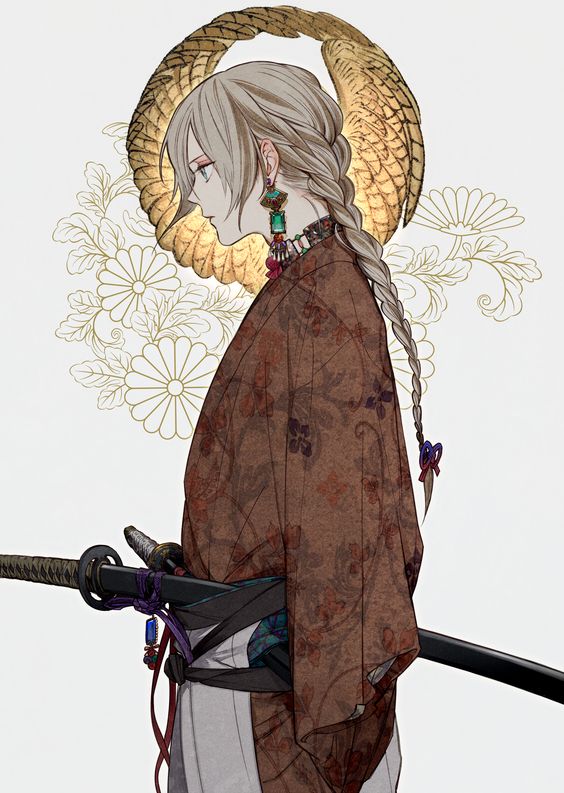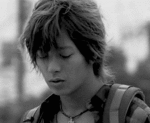Taking the sword into her hands, she leaned on it. She grasped the hilt so tightly that her knuckles were white, but she felt a sense of relief wash over her. As she did so, the blade itself reacted strongly as it surged with energy converted from what it had sapped from her. There was still a great deal of pain weighing upon her, but she could now focus with more clarity. The room she was in was calm, radiating with peace. It was as if a cooling salve had been applied to an old open wound and her breathing stabilized. The interior was as if it had been carved out of a deep blue carbuncle and for once such a color did not invoke a feeling of melancholy. In here, her soul was at rest.
At his mention of suffering a thousand deaths, she cracked a wry smile. "Not quite, though I'd say the number would be nearing the hundreds. It seems death likes to play coy with me, teasing me with life-or-death situations before cutting the rope at the last moment. I've been very unlucky. Perhaps that's why I've managed to live this long." Leaning back against the couch, she held onto the black blade with her left hand. "I am an outsider. I entered this world by the machinations of fortune, when I should have exhaled my final breath. The name is of no importance, only that it isn't anything like this one. It was during my final execution when I was displaced and thrown here." Shiloh then paused, contemplating how much more she should disclose. Continuing again, she spoke in a firm and clear voice.
"My name is Shiloh Kyrie. I arrived in Vilpamolan in a chained coffin. I believe there is no need to explain it further, as you can infer what was supposed to happen. You're probably wondering why someone like me would be carrying the weight of others' burdens. It's somewhat complicated, but I'm sure you have time to listen." Her voice trailed off as she recounted the beginning of the myth of the phantom who consumed shadows.
Once upon a time, there was a young woman who lived with her father. Her mother had died when she was but a girl, and her father had never remarried. They ran a modest estate, but when times grew tough and harvests failed the father was forced to borrow money to keep them afloat. Unfortunately the next following years continued the bad harvests, and soon they were unable to repay. It was then when the father and daughter were faced with a decision: sell their land to pay their debts and lose everything, or have the daughter take the offer of marrying a young lord in exchange for payment of their debts. The father was against it; he implored his daughter not to take the offer. Even if they had no land or home, they would still have each other. They could always find another way to pay off what they owed. But seeing that her father was getting along in years, the daughter could not bear to see him suffer. So she went against her conscience, and sold herself in exchange for her family's estate.
There was no love in that marriage. The man she wed was a cold and self-absorbed aristocrat. From the first day after their marriage she was forced to abide by a set of rules imposed by her husband. She was not allowed to move about freely, and could only leave the house with his permission. Every aspect of her life was controlled by his whims and executed by the servants, from what she wore to what she ate. Her friends and father were not allowed to see her, and it was no better than imprisonment in luxury. No matter how she tried to please him, she was met with coldness. Soon her long-suffering kindness wore out, and she fell into despair. She lost the will to eat, the will to live. After nearly tumbling from the balcony her servants were ordered to keep a close watch over her for her health's sake. There were times when in the darkness of despair, she contemplated taking her own life. One night after attending a gala with her husband, she knelt before an open window in her room and prayed. Shedding bitter tears she begged for anyone, anything who could hear her plea to rescue her from her golden cage. As the tears ran down face and onto her neck, she promised to give anything for a chance to escape.
Lo and behold, someone had heard the cry of her heart and in the night's silence a voice replied: 'You say are willing give anything for your freedom…is that right?'
Startled, she was taken aback by a shadowy silhouette before her. As she stared in shock the voice continued. 'The price of freedom is high. If you wish to gain anything, you in turn must give everything. So are the terms of my contract. Will you accept, or will you deny? The choice is yours.'
Though the figure before her was unearthly and sinister, she reached up and took its hand and whispered the words. "…I accept." In the twinkling of an eye, a fierce gale blasted the house–beating against the walls as if to tear it asunder. The servants were thrown into a panic and it was as if the entire foundation of the building was being shaken apart. In the dark of the night the woman watched as a grin spread across its face and the moon obscured by the clouds came into full view. 'You have chosen liberty, thus it shall be so. In exchange for everything you will be given a second chance in life. Listen now to my words, take heed and burn them into your memory. If you truly desire freedom, then you must do as I instruct you or all your actions will be in vain. You must cut all ties to your husband and have him release you out of his own will. Only when your bonds of marriage are broken will you be able to fly free.'
The woman in turn responded: "How can this be done? There is no way for me to convince him. His heart is colder than ice and more unfeeling than stone. None of my sweet words or tears can move his hand in my favor." 'That is where you are wrong, milady. You need not waste such heartfelt sentiment over him. Rather, you must go with boldness and declare your own will of separation. If he will not give heed when you ask of him, then you must demand it. I will do my part in seeing that all comes to fruition. However when you declare your independence, you must refuse to take a single coin that belongs to him. Abandon everything that does not belong to you, and only take what you had before you became his wife. This is the first step to your freedom. Do this, and perhaps you will see a miracle.'
And so the woman obeyed the phantom's instructions and requested an audience with the lord. She declared her desire to break off her marriage with him and relinquish her position as his wife. When the man questioned her she felt her heart falter, but when she saw a glimpse of the phantom in the corner of the window she regained her resolve. For the first time in her life under that man's roof, she gave her demands. She declared the marriage be annulled and that she did not want a single penny in compensation. The debts of her father's estate had been paid in exchange for her marriage to him, and now that had been fulfilled there was no reason for her to continue any longer. Her husband denied her, and she was taken out of his sight by the guards. However as she was ushered out of the room she saw the phantom smile as it reached its hand to the glass. A week after being confined to her room, she overheard whispers from the servants.
On the day she had demanded her freedom, her husband's closest guards discovered a rusty knife embedded in the mantel of the study's fireplace bearing a note in ink of crimson red, penned by an unknown hand. The details of the letter were not disclosed, but they believed it was the work of a vengeful spirit out for blood. Later she was called in by her husband, who chose to concede to her demands. During her confinement strange things had been happening around the lord that forced his hand to sign the marriage annulment. In the presence of a magistrate and other witnesses, their union was legally dissolved. As the phantom had instructed, she took the things she had brought with her upon first entering that house and left. But before she reached the outskirts of town, the phantom visited her again. She thanked it for granting her wish and giving her freedom, yet the shadow told her it was not yet finished with its work. 'You have completed the first two steps, yet there is one more thing you must do. Your husband will renege on his promise, and will no doubt send men after you. To truly sever the last remaining link between you and him, you must give up your name.'
It asked of her a hard thing, and she resisted. The phantom spoke to her softly, reminding her that this was the price for being freed from that man's intentions, and that once this was done she would receive the new life she had asked for. 'In your marriage you had given your birth name, thus you can no longer use that name for yourself. You can choose for yourself a new name, any one you like. This new name will be the start of your new self and your new life…'
As Shiloh concluded the story, she set the tourmaline blade against the couch. "Before the woman left with her new name, the phantom took its payment by taking all the grief and suffering she had endured in her marriage to that man. In an act of goodwill for the completion of their contract, the phantom foiled and harried the lord's men at every turn until they relented, allowing the woman to live in peace. Every sting and pain I feel from these shadows are borne from grief that they would have carried for a lifetime. Looking back on the things I have done, I have begun to wonder if I was truly helping them or performing acts of charity for my own selfish desires."














